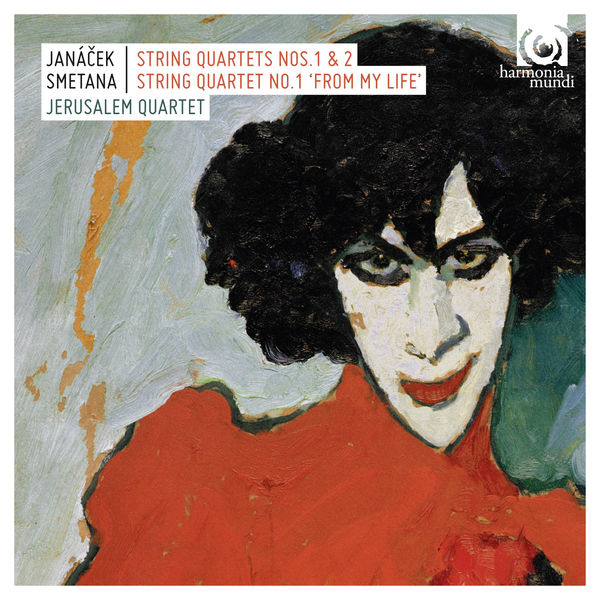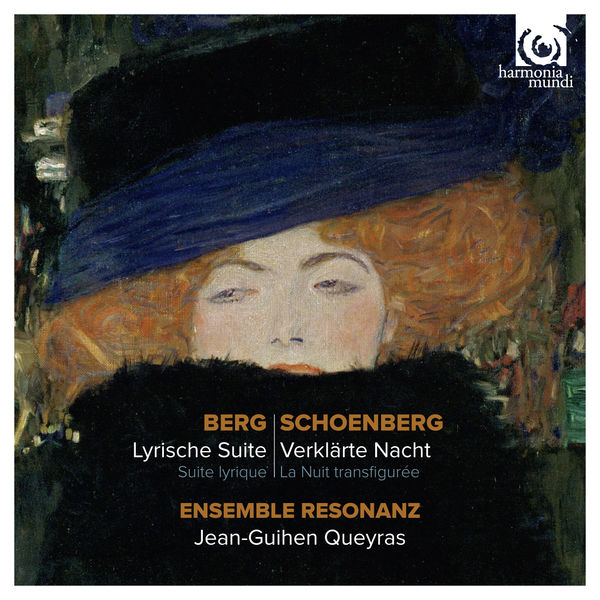Classical CD Reviews: Smetana and Janacek — String Quartets, Schoenberg and Berg — Music for Strings (Harmonia Mundi)
Two new recordings from Harmonia Mundi offer gripping performances, including one of the Smetana String Quartet no.1 that’s particularly full of fire and life.
By Jonathan Blumhofer
There is no shortage of recordings of Bedrich Smetana’s String Quartet no. 1 (“From My Life”), so it’s always nice when one comes along that makes you forget about (most of) the ones that are already out there. The Jerusalem Quartet’s new recording of “From My Life,” paired with the two quartets of Leos Janacek, is just such a disc. The Smetana gets a reading that’s full of fire and life: listen to how the Jerusalem’s (especially violist Ori Kam) launch into the first movement’s opening theme – the playing is positively explosive. And the energy never really abates, even when the music calms down or turns tragic. The third movement is hair-raising in its intensity. This is, simply, a gripping performance, all around.
And it’s not even the best one on the album.
That distinction, for my money, would go to the Jerusalem’s reading of Janacek’s First Quartet (“Kreutzer Sonata”), which draws loosely on themes from Tolstoy’s novel. Janacek wrote both of his quartets towards the end of his life and they’re fascinating statements by one of the most significant and progressive composers of the early 20th century. The Quartet no. 1 is, in some ways, the more conventional of the two, but there’s nothing tame about its spastic content. This is music that can turn from introspection to unbridled exhibition on a dime (just check out its second movement) and the harmonic writing, though clearly motivic and rooted in late-19th-century Romanticism, is firmly in line with the chromaticism of Debussy and other early 20th-century composers.
The Jerusalem’s performance is, again, full of gusto and closely attuned to all of Janacek’s abrupt shifts of tone and mood.
The same can be said for the (slightly) stranger Second Quartet (“Intimate Letters”). There’s a Beethovenian quality to much of the writing – shifts of style, texture, dynamics, and so forth recall op. 131 – though it’s filtered through Janacek’s particular brand of Czech-flavored tunefulness. No matter: it’s a piece whose masterful craftsmanship comes across with striking power in an altogether very impressive outing by the Jerusalem’s.
*****
Rough contemporaries of Janacek, Alban Berg and Arnold Schoenberg retain much more familiar popular presences, though it’s always welcome to find new recordings of much of their music. Ensemble Resonanz and Jean-Guihen Queyras present two hearty readings of pieces by each on their new HM album.
Berg wrote the Lyric Suite in 1925 for string quartet, though he later expanded three of its movements for string orchestra. The Dutch composer Theo Verby finished the job, arranging the remaining three, and the current disc features his expansions paired with Berg’s. Unfortunately, enlarging the Lyric Suite’s instrumentation robs the music of much of its immediacy and this performance lacks the intensity one normally encounters in the original setting. It’s well played: Ensemble Resonanz delivers a rich, warm performance that well suits Berg’s expressive language, and the fifth movement, particularly, features some striking, emphatic moments. It’s just that the whole piece feels heavy-handed and unconvincing – the polar opposite of the Jerusalem’s Janacek performances.
Schoenberg’s Verklärte Nacht fares better. Again, Queyras and Ensemble Resonanz opt for the string orchestra version of the piece (it was originally for string sextet), but here they deliver a performance that’s high on lyricism and tightly in sync with the music’s underlying dramatic structure. There are a couple of classic recordings of the string orchestra version of Verklärte Nacht on the market (James Levine’s and Herbert von Karajan’s are at the top of my list – both with the Berlin Philharmonic) and this reading hangs with the best of them. It’s a pity the same can’t be said for the Berg: in that instance, at least, smaller is definitely better.
Jonathan Blumhofer is a composer and violist who has been active in the greater Boston area since 2004. His music has received numerous awards and been performed by various ensembles, including the American Composers Orchestra, Kiev Philharmonic, Camerata Chicago, Xanthos Ensemble, and Juventas New Music Group. Since receiving his doctorate from Boston University in 2010, Jon has taught at Clark University, Worcester Polytechnic Institute, and online for the University of Phoenix, in addition to writing music criticism for the Worcester Telegram & Gazette.
Tagged: Ensemble Resonanz, Harmonia Mundi, Jean-Guihen Queyras


